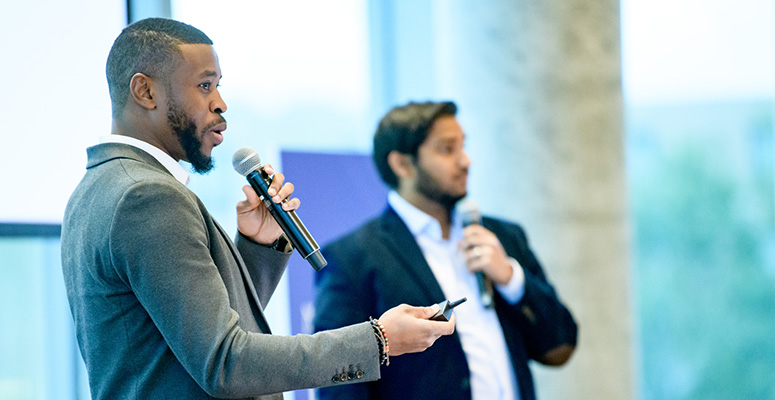Building Healthier Communities Through Opal
“It’s not about changing technology but changing the human mindset. Our goal is designing a device that will help change human behavior so that [people] can solve the problem,” says Irewole Akande (ENGM ’17), co-founder and chief technology officer of City Health Tech, a public-health startup that aims to use technology to build healthier communities and mitigate the spread of infectious diseases. Akande is applying his background in connected devices and analytics to address the lack of knowledge about proper handwashing techniques through design innovation.
Akande met his business partner, Ibraheem Alinur, chief executive officer and co-founder of City Health Tech, at the Chicago Connectory two years ago. After reviewing information provided by the Centers for Disease Control and Prevention, Akande was struck by the number of cases of the common cold reported each year in the United States and how proper hand hygiene could help prevent serious illnesses and potentially save hours of productivity in schools and workplaces.
Since then, Alinur and Akande teamed up to build their first product: a device with a full-color display screen that attaches to sinks and teaches individuals how to properly wash their hands, while gathering data on actual handwashing practices. Dubbed Opal, the device guides the user through proper handwashing techniques for a minimum of 20 seconds, providing step-by-step instructions.
“The full scale of our solution involves standardizing community health education with our IoT [internet of things] handwashing assistant Opal and an accompanying dashboard platform to visualize and gain insights from handwashing data,” says Akande.
City Health Tech is working toward partnering with elementary schools in the Chicago area to help communities that are most affected by the COVID-19 pandemic. This summer Akande and his team finalized the product design and are currently fundraising capital to manufacture and deliver the device to pilot customers. In the future they hope to partner with organizations to provide sponsored content and make the device affordable for as many people as possible.
Akande’s entrepreneurial spirit drove his desire to attend Illinois Institute of Technology and to develop innovative solutions to improve people’s lives.
He shares that one of the biggest challenges his team is facing as minority founders occurs when individuals ask them about raising a “family and friends” funding round and to tap into existing relationships. “This is a tough pill to swallow because, with our backgrounds, we have access to individuals with barely enough money to break even [much] less talk of long-term investments,” says Akande. “As a result, we have bootstrapped the company with over $25,000 awarded from competitions and grants.”

Akande indicates that his team’s ability to come as far as they have despite scarcity speaks to their resourcefulness as entrepreneurs and tenacity as first-time minority founders. He notes that they were listed on the “2020 Accelerated Liftoff List,” which distinguishes them among the top 25 most promising student startups in the U.S. and Canada. This selective list included 24 percent of companies that have raised more than $1 million and 32 percent of companies that have raised between $100–$500K.
“The perception can sometimes be that we have not done enough to raise funds, when realistically, we are not afforded similar privileges,” he adds. Akande points to a mindset change that needs to occur to drive much-needed equity in funding scenarios.
“I would like to implore those with means to help create a community of cross-functional experts that spearhead initiatives to identify, mentor, and invest in the next generation of diverse entrepreneurs,” shares Akande. “Specifically, [this includes] funding minorities who are building novel products to tackle societal problems around the world to usher in a new generation of tech-focused businesses that will, in turn, elevate marginalized communities.”